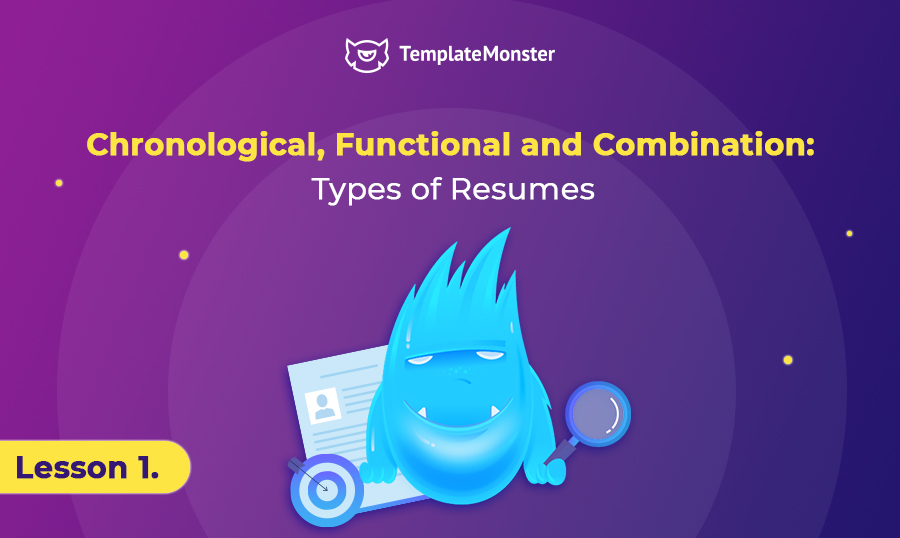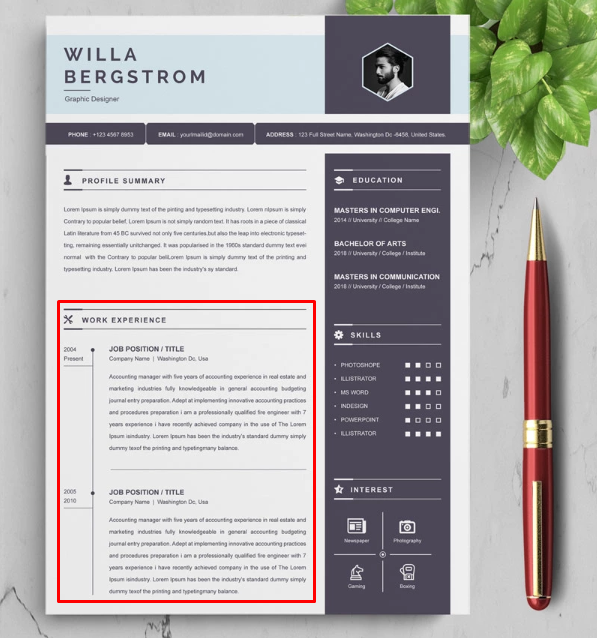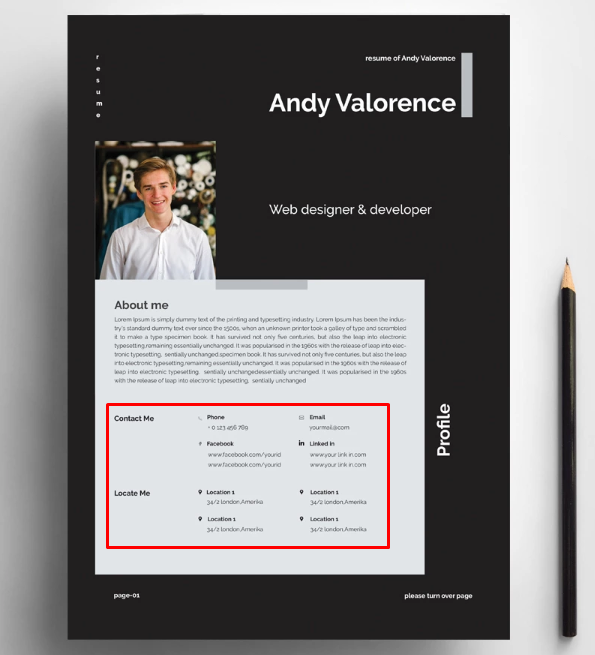Chronological, Functional and Combination: Types of Resumes
This is the first lesson of our Perfect Resume Creation: Ultimate Course. If you would like to get through the whole course – follow the link and subscribe.
Outline:
- When to use a chronological resume?
- Functional resume. Where is it most applicable?
- Basic parts of a skill-based resume
A resume (CV) is one of the main components of the hiring process. According to the rules of business etiquette, it is the first thing you need to have when looking for a job. At the same time, it is one of the most effective methods of advertising yourself in the labor market.
It is not difficult to write a resume. It is more complicated to write it correctly and efficiently to attract an employer’s attention.
What are the types of resumes? What is right for you? What is better to focus on? Let's figure it out together.
There are three main types of resume templates:
- Chronological resume: Job experience is the central part of it. This type of resume includes a place of work with the company name, position, responsibilities, and achievements. A chronological CV allows you to demonstrate your job records. If you do not have any job experience yet, you should look at other types of resumes.
- Functional or Skill-based resume: This resume focuses on the advantages of the applicant’s skills and professional success. Exact dates and positions are not usually indicated.
- Combination resume: This type of resume combines the strengths of chronological CV and functional one. Here you can list all your experience, and achievements, describe the skills in more detail. Perhaps this is the most convenient type of resume. It allows you to demonstrate both your experience and highlight your professional achievements.
I won't be describing combitation resume type in details but we will take a closer look at the choronological and functional ones because combination CV consists of them.
Resume Checklist
When to use a chronological resume?
This type of CV is the most popular and is commonly used by all types of job-seekers. As I said previously, it’s main part is a list of your previous employments, sorted in chronological order. Usually, it is made in reverse chronological order, so that the employer could see the freshest your experience first. Education and certification data are also included in the list to show your progress in developing skills.
So, why you should create a chronological resume?
Experience in the appropriate or connected field
Lots of HR’s are looking for employees who have already worked in the necessary field for a few years. Such people already have some skill level and it will take lesser time to teach them. Two years of continuous experience will be enough to create a chronological resume.
The experience wasn’t interrupted by anything
In most of the vacancies they say that some number of years of experience is needed, however, it means the undivided experience. If you have worked for a year, then changed the field and turn back after some time – only the last period will count.
Strict order
A chronological resume documents that have a clear structure. The information about you is given in order and there’s no mess. If you are a person that loves everything to be clear and strict – you surely should choose this type of CV.
Easy to read and scan
The listing is easier to read and scan, that’s why it is more pleasant to go through it instead of reading a plain text. A chronological resume is built in perfect order, so it will be simple for the HR to find the data he needs to come to the decision about you.
Functional resume. Where is it most applicable?
A functional resume structures information based on skills rather than job positions. This is the best choice of a resume when you want to emphasize the correspondence of your knowledge, skills, and experience to the types and areas of activity that are represented in the vacancies.
Let’s check the situations, where a functional resume works best for you.
1. Transition to a new position
A functional resume is the one you should use where specific skills are more important than formal experience. In this case, your employer will not be interested in your job description as a designer while you are applying for a web developer position.
2. Employment gap
Functional CV works better for those candidates who had a gap between jobs or a brief experience. In this way, specific skills and capabilities are emphasized to highlight the job seeker's abilities.
3. Lack of job experience
If you have just graduated, or there is no much job experience to tell the employer about, think about a skill-based resume. List all the skills and abilities you obtained during the education period.
4. One employer for years
There are situations when you work for one employer for years. You develop new skills, take different responsibilities, change departments, but you keep working for one company. This is the case, where it is better to use a functional resume to specify all the skills, achievements, and multiple roles within the company.
5. Applicants with portfolio
A skill-based resume is more applicable to designer positions. The recruiting team will pay attention to the skillset and portfolio rather than the descriptions of the projects you handled.
Opinions of recruiting specialists are divided. Some of them agree that it is a convenient format to review a candidate’s skills block, especially for senior positions. Some of them are not impressed due to the lack of description of tasks and responsibilities.
Basic parts of a skill-based resume
1. Contact information
In this section you specify:
- name/surname;
- place of residence;
- contact phone number;
- email;
- date of birth;
- marital status (optional).
2. Summary
A resume summary (resume profile/about me) is a couple of sentences at the top of your resume (after your contact information) that describe your relevant skills and qualifications for a job to catch a hiring manager’s attention from the first glance.
3. Skills & qualifications
There are three types of skills:
- job-related (PHP, HTML, etc.);
- transferable skills (team management, working with vendors, etc.);
- personal skills (team player; punctual; attentive).
Ideally, if you have a good mix of all the skill types above and highlight them on your resume.
4. Accomplishments and awards
The scheme is the following: situation + what exactly was done + result.
Your accomplishments section can be either a separate one or included in the description of your skills/work experience.
5. Experience history
It is a chronological list of your employment history.
6. Education
Make sure you list institutions, classes, seminars, training, and where you studied.
If you have a portfolio, link it to your website or social networks.
Click the link to get more examples of professional resume templates. Wish you to hear ‘You are hired!’ soon.
Conclusion
Wisely chosen resume type could be that tiny detail that will guarantee your success. Write down your experience and skills to the piece of paper and analyze them. Choose the type of CV that will highlight your strongest features and mask the weak ones. It is also important to choose a high-quality resume template – it will help you to step out of the line. Good luck with getting your dream job!
Read Also
How to Make Your Resume Better With Keywords & Phrases
How to Effectively List Professional Skills on Your Resume
Get more to your email
Subscribe to our newsletter and access exclusive content and offers available only to MonsterPost subscribers.










Leave a Reply
You must be logged in to post a comment.